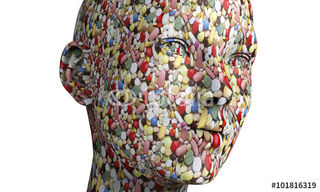Placebo
Revisiting the Placebo Effect
Self-healing power of the body is revealed
Posted March 14, 2016

Researchers have used controlled groups in clinical trials to test the effectiveness of medical interventions or drugs against what is commonly referred to as the Placebo Effect. The placebo effect is when an individual’s medical condition or pain shows signs of improvement based on a fake intervention that has been presented to them as a real one. It is regularly dismissed by researchers as a psychological effect that has to be controlled for in clinical trials to gauge how much of a patient’s improvement is based on the “real” intervention.
But what if placebo effects are more significant than they have been given credit for? The placebo effect represents the power of the mind to trigger biochemical changes because the individual believes that a given drug or intervention will be effective. In her groundbreaking work entitled, “Mind over Medicine: Scientific Proof that you can Heal Yourself” Dr. Rankin, M.D., argues that placebo effects represents not only the power of the mind but the powerful mind-body connection. Moreover, she argues that the placebo effect represents the innate capacity of our bodies to heal themselves. In fact, Rankin (2013) shares that, “Placebos don’t just change how you feel, they change your biochemistry” (11).
We are indoctrinated within Western culture in particular to feel as if we have no control over our bodies, that we are subject to the fate of our genes and that when we develop diseases the best we can do is try to manage them or seek cures through potent (and often, expensive) medical interventions. The notion that our bodies have a self-healing mechanism is not only empowering, but game changing. Rankin (2013) lists some of the most common explanations for the placebo effect.
Firstly, the placebo effect indicates that, “patients experience symptom relief and manifest psychological change because they think they will” (Rankin, 2013, p 12). There is ample evidence regarding placebo effects that support this. The mind can be a powerful mechanism that triggers physiological reactions in the body. Believing in a treatment can lead to an attenuation or complete cessation of symptoms. For instance, patients experiencing pain who are explicitly told in a hospital setting that they are being given morphine will immediately report relief even though it takes time for the morphine to work in their system. Similarly, depressed patients will oftentimes report feeling better when they start taking antidepressants even though it takes weeks for the drugs to alter their biochemistry. In fact, “analysis of the published data and the unpublished data that were hidden by drug companies reveals that most (if not all) of the benefits [of antidepressants] are due to the placebo effect” (Kirsch, 2014, Abstract).
The placebo effect is not solely based on believing in a treatment, however. The clinical setting in which treatments are administered is also paramount. For instance, the power of an expert, in this case a medical doctor, in a white lab coat, and our deferring to their expertise can play a large role in triggering placebo effects. This combines two additional explanations of the placebo effect: a classically conditioned response in improving because we expect to when doctors administer us drugs, in addition to responding positively to being given care and support by health care practitioners (Rankin, 2013).
For instance, in investigating specifically the role that patient care may play in the strength of a placebo effect, Ted Kaptchuk, one of the creators of the Program in Placebo Studies and Therapeutic Encounter (PiPS), has documented with his experiments that, “the patients who experienced the greatest relief [with placebos] were those who received the most care” (Feinberg, 2013, para 11). Such a finding has huge implications for the health care system as it operates in our culture today, where depleted resources and time lead to patients rotating in and out of doctor’s offices, oftentimes receiving minimal care or concern (what is commonly referred to as “bed side manner”) from doctors.
Placebo effects have been studied within the last twenty years or so not just as foils for “real” interventions but as a potential portal into the self-healing powers of the body. The notion of our bodies’ capacity for self-healing can be empowering, particularly for those of us suffering from chronic medical conditions. As Rankin (2013) reflects, “We’re left to conclude that although physiological changes experienced with placebos may not be the result of positive belief alone, the placebo effect nonetheless confirms a mind-body link and the body’s innate capacity for self-repair” (13).
Feinberg, C. (2013, January-February). The Placebo Phenomenon. Harvard Magazine. Retrieved on March 14, 2016 from: http://harvardmagazine.com/2013/01/the-placebo-phenomenon
Kirsch, I. (2014). Antidepressants and the Placebo Effect. Z Psychology, 222(3), 128-134. Retrieved on March 14, 2016 from: http://www.ncbi.nlm.nih.gov/pmc/articles/PMC4172306/
Rankin, L. (2013). Mind over Medicine: Scientific proof that you can heal yourself. Hay House, Inc.: United States.
Copyright 2016 Azadeh Aalai


